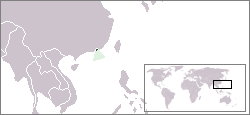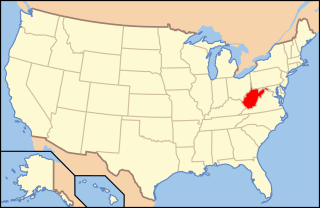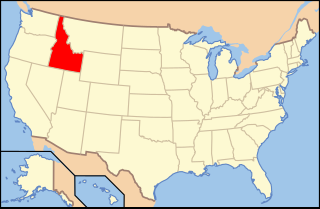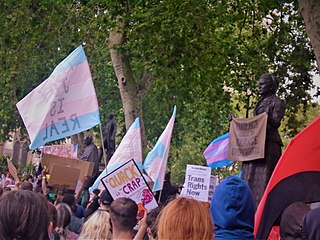Related Research Articles
The legal status of transgender people varies greatly around the world. Some countries have enacted laws protecting the rights of transgender individuals, but others have criminalized their gender identity or expression. In many cases, transgender individuals face discrimination in employment, housing, healthcare, and other areas of life.

Transgender rights in Canada, including procedures for changing legal gender and protections from discrimination, vary among provinces and territories, due to Canada's nature as a federal state. According to the 2021 Canadian census, 59,460 Canadians identify as transgender. Canada was ranked third in Asher & Lyric's Global Trans Rights Index in 2023.

Transgender is an overarching term to describe persons whose gender identity/expression differs from what is typically associated with the gender they were assigned at birth. Since "transgender studies" was institutionalized as an academic discipline in the 1990s, it is difficult to apply transgender to Chinese culture in a historical context. There were no transgender groups or communities in Hong Kong until after the turn of the century. Today they are still known as a "sexual minority" in China.
The history and subculture surrounding transgender people in Singapore is substantial. As with LGBT rights in the country in general, transgender rights in Singapore have also evolved significantly over time, including various laws and public attitudes in regards to identity documents, as well as anti-discrimination measures used by or pertaining to transgender people, in the areas of employment, education, housing and social services, amongst others.

Lesbian, gay, bisexual, and transgender (LGBT) people in Hong Kong may face legal challenges not experienced by non-LGBT residents.
In the United States, the rights of transgender people vary considerably by jurisdiction. In recent decades, there has been an expansion of federal, state, and local laws and rulings to protect transgender Americans; however, many rights remain unprotected, and some rights are being eroded. Since 2020, there has been a national movement by conservative/right-wing politicians and organizations to target transgender rights. There has been a steady increase in the number of anti-transgender bills introduced each year, especially in Republican-led states.

Lesbian, gay, bisexual, and transgender (LGBT) people in the U.S. state of West Virginia face legal challenges not faced by non-LGBT persons. Same-sex sexual activity has been legal since 1976, and same-sex marriage has been recognized since October 2014. West Virginia statutes do not address discrimination on account of sexual orientation or gender identity; however, the U.S. Supreme Court's ruling in Bostock v. Clayton County established that employment discrimination against LGBT people is illegal.

Lesbian, gay, bisexual, and transgender (LGBT) people in the U.S. state of Indiana enjoy most of the same rights as non-LGBT people. Same-sex marriage has been legal in Indiana since October 6, 2014, when the U.S. Supreme Court refused to consider an appeal in the case of Baskin v. Bogan.

Lesbian, gay, bisexual and transgender (LGBT) people in the U.S. state of Idaho face some legal challenges not experienced by non-LGBT people. Same-sex sexual activity is legal in Idaho, and same-sex marriage has been legal in the state since October 2014. State statutes do not address discrimination based on sexual orientation and gender identity; however, the U.S. Supreme Court's ruling in Bostock v. Clayton County established that employment discrimination against LGBT people is illegal under federal law. A number of cities and counties provide further protections, namely in housing and public accommodations. A 2019 Public Religion Research Institute opinion poll showed that 71% of Idahoans supported anti-discrimination legislation protecting LGBT people, and a 2016 survey by the same pollster found majority support for same-sex marriage.
Transgender disenfranchisement is the prevention by bureaucratic, institutional and social barriers, of transgender individuals from voting or participating in other aspects of civic life. Transgender people may be disenfranchised if the sex indicated on their identification documents does not match their gender presentation, and they may be unable to update necessary identity documents because some governments require individuals to undergo sex reassignment surgery first, which many cannot afford, are not medical candidates for, or do not want.
Joanne Leung Wing-yan is the first openly transgender politician in Hong Kong.
Transgender rights in Australia have legal protection under federal and state/territory laws, but the requirements for gender recognition vary depending on the jurisdiction. For example, birth certificates, recognised details certificates, and driver licences are regulated by the states and territories, while Medicare and passports are matters for the Commonwealth.

Multiple countries legally recognize non-binary or third gender classifications. These classifications are typically based on a person's gender identity. In some countries, such classifications may only be available to intersex people, born with sex characteristics that "do not fit the typical definitions for male or female bodies."

Transgender rights in the United Kingdom have varied significantly over time, with transgender Britons facing certain social challenges not experienced by non-trans individuals. These include various laws and public attitudes in regards to identity documents, as well as anti-discrimination measures used by or pertaining to transgender people, in the areas of employment, education, housing and social services, amongst others.

Transgender rights in the Federal Republic of Germany are regulated by the Transsexuellengesetz since 1980, and indirectly affected by other laws like the Abstammungsrecht. The law initially required transgender people to undergo sex-reassignment surgery in order to have key identity documents changed. This has since been declared unconstitutional. The German government has pledged to replace the Transsexuellengesetz with the Selbstbestimmungsgesetz, which would remove the financial and bureaucratic hurdles necessary for legal gender and name changes. Discrimination protections on the basis of gender identity and sexual orientation vary across Germany, but discrimination in employment and the provision of goods and services is in principle banned countrywide.
This article addresses the legal and regulatory history of transgender and transsexual people in the United States including case law and governmental regulatory action affecting their legal status and privileges, at the federal, state, municipal, and local level, and including military justice as well.
Hong Kong does not recognise same-sex marriages or civil unions. However, same-sex couples are afforded limited legal rights as a result of several court decisions, including the right to apply for a spousal visa, spousal benefits for the partners of government employees, and guardianship rights and joint custody of children.

Gender self-identification is the concept that a person's legal sex or gender is determined by their gender identity without any medical requirements, such as via statutory declaration.

Legal gender, or legal sex, is a sex or gender that is recognized under the law. Biological sex, sex reassignment and gender identity are used to determine legal gender. The details vary by jurisdiction. Legal gender identity is fundamental to many legal rights and obligations, including access to healthcare, work, and family relationships, as well as issues of personal identification and documentation. The complexities involved in determining legal gender, despite the seeming simplicity of the underlying principles, highlight the dynamic interaction between biological characteristics, self-identified gender identity, societal norms, and changing legal standards. Because of this, the study of legal gender is a complex field that is influenced by cultural, historical, and legal factors. As such, a thorough investigation is necessary to fully understand the subject's implications and breadth within a range of legal systems and societies.
This is a list of notable events in the history of LGBT rights taking place in the year 2023.
References
- 1 2 3 4 5 de Guzman, Chad (May 23, 2023). "He Won a Landmark Trans Rights Case in Hong Kong—But His Work Is Just Beginning". Time . Retrieved June 8, 2023.
- 1 2 3 "Transgender men win Hong Kong court case over ID cards". NBC News . Associated Press. February 7, 2023. Retrieved June 8, 2023.
- 1 2 Lau, Chris (January 29, 2023). "'I want to show the diversity within Hong Kong's transgender community': activist Henry Edward Tse in court battle for ID card gender change publishes book". South China Morning Post . Retrieved June 8, 2023.
- ↑ Pang, Jessie (March 31, 2023). "Hong Kong transgender protesters say government is not abiding by landmark ruling". Reuters . Retrieved June 8, 2023.
- ↑ Pang, Jessie (February 6, 2023). "Hong Kong court makes landmark ruling protecting transgender rights". Reuters . Retrieved June 8, 2023.
- 1 2 3 4 5 6 7 Li, Almond (February 13, 2023). "Hong Kong trans activist Henry Tse fought for the right to be recognised as a man without full surgery – and won". Hong Kong Free Press . Retrieved June 8, 2023.
- ↑ "Dreams of 'normal life' fuel HK trans activist's fight". Taipei Times . March 8, 2023. Retrieved June 10, 2023.
- 1 2 3 Baska, Maggie (February 17, 2023). "Trans man who won historic Hong Kong legal case still can't 'live a normal life'". PinkNews . Retrieved June 8, 2023.
- ↑ "Hong Kong: Court ruling a setback in fight for equality for transgender people". Amnesty International . February 1, 2019. Retrieved June 8, 2023.
- ↑ de Guzman, Chad (3 April 2024). "Hong Kong Amends Its Surgery Requirements to Change Gender Markers on IDs". Time . Retrieved 29 April 2024.
- ↑ Leung, Kanis (29 April 2024). "Hong Kong Transgender Activist Henry Tse Receives New ID Card After Yearslong Battle". Time . Retrieved 29 April 2024.